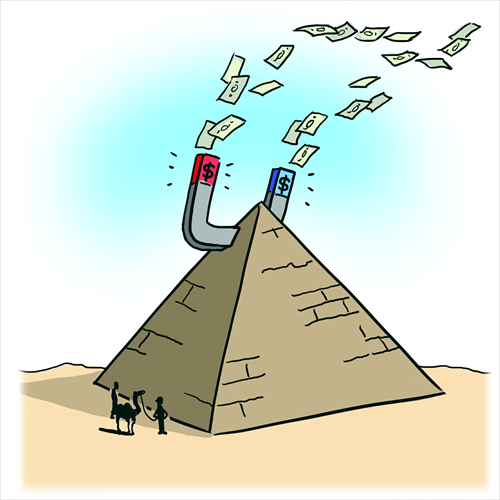HOME >> OP-ED
Egypt’s economic revolution draws investors
By Naglaa El-Ahwany Source:Global Times Published: 2015-3-19 18:28:01

Illustration: Liu Rui/GT
Egypt is most often associated with turmoil and political upheaval, but investors are flooding back to the Arab world's most populous country drawn by the country's quiet revolution of economic, legislative and regulatory reform.The development of national mega infrastructure projects, supported by investment, tax, and subsidy reform, and creating an environment for the growth of small and medium enterprises, has been instrumental in the ratings uptick and in attracting foreign direct investment (FDI).
In the last quarter alone, major multi-nationals have poured investment into Egypt. Food giant Kellogg's acquired a majority stake in Cairo-based Bisco Misr, a leading packaged biscuits company in Egypt, while leading tech firm IBM announced a multi-million dollar investment in building one of its innovative global sales centers in Cairo.
By encouraging broad-based development, supported by strong foreign investment, Egypt can stand out and avoid some of the development traps that have held back the region. Properly fostered, this new economic revival can both help improve standards of living and provide a model for inclusive sustainable growth within the region.
The Egyptian government is aiming to tread a middle path, encouraging broad-based growth which exploits Egypt's natural resources and encourages export industries, but at the same time retains and builds on an already strong internal consumer market. Foreign investors are beginning to recognize this diversity and place their money behind this broad-based multi-sector model.
It is little surprise that international companies are returning to the Egyptian market. All the basics for sound economic development are in place, starting with a population of almost 90 million people, 50 percent of whom are between 15 and 44. This is combined with a unique strategic location linking Africa to Asia and, with the Suez Canal, within easy reach of world markets in Europe and the Far East. This geographical dividend has been boosted by multiple free trade agreements with the EU, the Gulf Cooperation Council and African nations. Egypt superbly balances a growing and significant domestic market, with a perfect platform for global exporters.
Much of this infrastructure has been in place for decades, but Egypt suffered severely from the double blow of the world economic downturn and the instability of revolution. From a high of $13 billion in fiscal year 2007-08, FDI in Egypt plummeted to a mere $2.2 billion in fiscal year 2010-11. In fiscal year 2013-14, FDI bounced back to over $4 billion, with an additional $1.8 billion in first quarter of fiscal year 2014-15, possibly surpassing pre-crisis levels by 2016.
Part of this recovery is clearly the restoration of political stability, and the transition to a new constitutional settlement as marked by the parliamentary elections to be held in March and April this year. However, political stability alone is not enough to explain the resurgence of confidence; stability without growth hamstrung the Arab world for much of the postwar period.
The new surge in FDI represents something more - an international appreciation, expressed in upgrades from the international ratings agencies and recently through the IMF's Article IV report, of the fact that this government is genuinely committed to making Egypt a business friendly environment.
The Egypt Economic Development Conference (EEDC), which was held in Sharm El Sheikh on March 13 to 15 and attended by thousands of delegates and speakers from across the world, shed light on this new impressive economic momentum to attract foreign investment.
Egypt still has many economic challenges to overcome, but backed by an inflow of foreign capital, momentum is beginning to build.
The broad-based multi-sector investment approach is designed to overcome the historic challenge facing the region of over-reliance on a single sector. With persistence and investor friendly reforms, we are confident that Egypt can resume its place as one of the key economies in the Middle East and an example to the region.
The author is Minister of Investment of Egypt. opinion@globaltimes.com.cn
Posted in: Viewpoint